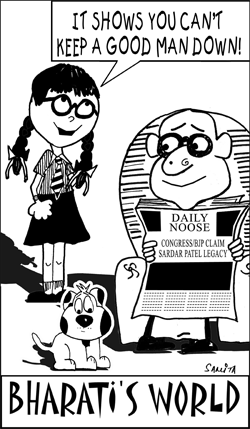Over 80,000 high school teachers of 20,000 state government and government aided secondary schools in Karnataka are all set to strike work in mid-November to force the six-month-old Congress state government led by chief minister M. Siddaramaiah, to raise their pay to the Sixth Pay Commission scales of Central government schools. At a meeting organised by the Karnataka State High School Assistant Masters Association (KSHSAMA) in Bangalore on October 22, teacher representatives from 35 education districts of the state adopted a resolution to boycott the evaluation of answer scripts of the state board’s class X SSLC (Secondary School Leaving Certificate) exam scheduled for March 2014, if the state government doesn’t concede their demand.
According to the association, for over a decade state government secon-dary school (classes IX-X) teachers have suffered unequal pay scales. Currently the basic pay of a newly recruited government high school teacher in the state is Rs.17,000 per month, while the Sixth Pay Commission (2012) recommended Rs.40,000 for Central government (Kendriya Vidyalaya, Jawahar Navodaya, Indian Railways schools etc) teachers. “Our salaries are still stuck at the Third Pay Commission level. While the state government has raised the basic pay scale of its clerical cadre employees to Rs.21,600-40,050, it has neglected high school teachers’ salaries which have been frozen at Rs.17,600-32,500 since 2003. This is unfair as all government secondary school teachers are postgraduates with B.Ed qualifications, unlike government administrative staff who may be mere grad-uates,” says H.K. Manjunath, secretary of KSHSAMA.
 The state government’s response to the teachers’ demands is lukewarm if not indifferent, though education department officials are wary of a full-blown strike. “The government will negotiate with the association to see how best its demands can be met. Teachers associations always threaten to go on strike, but we will ensure the SSLC exams evaluation is not affected at any cost. In the current economic situation, it’s difficult for the state government to give teachers such a huge raise,” says H.S. Rama Rao, additional commissioner, department of public instruction.
The state government’s response to the teachers’ demands is lukewarm if not indifferent, though education department officials are wary of a full-blown strike. “The government will negotiate with the association to see how best its demands can be met. Teachers associations always threaten to go on strike, but we will ensure the SSLC exams evaluation is not affected at any cost. In the current economic situation, it’s difficult for the state government to give teachers such a huge raise,” says H.S. Rama Rao, additional commissioner, department of public instruction.
Addressing the teachers’ demands requires the state government to substantially increase its budget allocation for school education. In the state Budget 2013-14 presented by the newly elected Congress government, the allocation for primary and secondary education is Rs.15,599 crore — a mere 3.39 percent of the state’s GDP — clearly insufficient to provide quality education to the state’s 10.97 million school-going children, and favourable work condi-tions to 221,410 teachers. Moreover, several research studies have estimated that 92 percent of the school education budget goes towards paying adminis-trative and teacher remuneration, leaving little for upgradation of infrastructure and academic facilities.
However KSHSAMA is unlikely to attract public sympathy despite their good case for pay parity with Central government school teachers, if not with clerical cadre civil servants. That’s because it’s hardly a secret that government school teachers are well-paid in comparison to teachers employed in state board-affiliated private unaided schools where monthly salaries are as low as Rs.6,000-Rs.12,000. “In private schools, teachers are forced to work long hours and penalised if students don’t fare well in board exams. There’s no such fear for government school teachers. Because they are heavily unionised, they demand high pay without accountability. Their strike call is not justified at all,” says a class X teacher of a private unaided school in Bangalore, who preferred to remain anonymous.
An unintended — and socially beneficial — outcome of the secondary school teachers pay parity agitation is that it is likely to highlight the hidden issue of teacher accountability. It’s well-known that 25 percent of teachers in government primary-secon-daries are absent every day and that learning outcomes in govern-ment schools are abysmal. There-fore, any concession to the agitating teachers is likely to have performance riders attached. Moreover, it may crystallise overdue reforms in teacher recruitment and remuneration across the board.
“Currently teacher remu-neration is cadre-based, i.e a primary school teacher with a Ph D is paid less than a mere graduate secondary teacher, and the latter is paid less than a junior college teacher. The public would be better served if pay is linked with teachers’ qualifications as it will facilitate the entry of well-qualified people into all segments of the education system. Such a system will also incentivise teachers to sign up for higher study programmes and upgrade their subject knowledge and teaching skills. This will have a beneficial impact on foundational primary education,” says Prof. A.S. Seetharamu, education advisor to the Karnataka government.
But asking state government educrats to apply themselves to evolving a sophisticated remuneration structure for teachers is a very tall order.
Sangeetha Samuel (Bangalore)



























